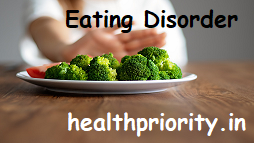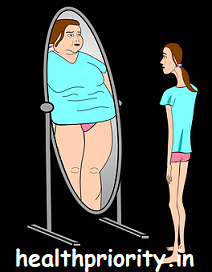What Are Eating Disorders? Types, Diagnosis And Treatment Of Eating Disorder. Know Whether Eating Disorder Are Mental Disorder?
Eating disorders are the deadliest mental health disorders that affects men and women of all ages, either diagnosed early in their teens and adolescent or sometimes later in adulthood.
Sometimes eating disorder and mental health develop together at the same time, where in an individual might get treated for either eating or mental disorder and one of it remains untreated.
Specifically mental condition remains untreated which leads to higher chances of relapsing or falling back into the same. Such mental condition are:
- Anxiety: Excessive state of worry.
- Depression: Intense state of sadness.
- Substance Abuse/Alcohol: Severe tolerance, addiction and dependence.
- Self-Injury: Causing physical harm to oneself.
- Obessive Compulsion Disorder (OCD): Unwanted thoughts(Obession) with repetitive acts(Compulsion)
Eating disorder are not a lifestyle choices, but are serious and fatal illness that are associated with changes in behavior of a person, thoughts and emotions leading to mental disorder.
✅Types Of Eating Disorder:
👉Anorexia Nervosa:
Person with Anorexia Nervosa frequently weigh themselves, avoid food, often fast and restrict food or eat a very small quantity of food.
They see themselves as overweight.
Its a least common disorder but very serious having highest death rate of any mental disorder.
👉Bulimia Nervosa
Person with bulimia nervosa at times eat a lot and then throw up using laxatives or either do excessive exercise or fast.
Person with bulimia nervosa is either normal, overweight or underweight.
👉Binge Eating
Person with binge eating have no control over eating.
Even though a person is full, he or she keeps on eating.
Although they feel guilt, shame and distress after eating too much.
This may lead to weight gain and obesity.
👉PICA
PICA is an eating disorder, wherein the person eat things that are not considered as food such as ice, dirt, chalk, soil, paper, cloth, pebbles, hair, detergent or soap.
The person eating these type of things are at high risk of infections, poisoning, deficiency in nutrition and sometimes causes gut injury.
PICA mostly occur in children, pregnant women and in a person with mental disabilities.
👉Rumination Disorder
Rumination disorder is an eating disorder which involves regurgitation of food the person have previously chewed or swallowed.
The person rechews it and then either reswallows or splits it out.
Rumination occurs with the first 30 mins after a meal, develops in infancy, childhood or adulthood.
Rumination disorder leads to weight loss and malnutrition.
👉Avoidant/Restrictive Food Intake Disorder
This Eating disorder generally develops in infancy and early childhood.
The person experience disturbance in eating either due to a lack of interest or due to lack of smells, tastes, color, texture or temperature.
There also occurs insufficiency in calories or nutrients and weight loss or poor development for age and height.
👉Other Eating Disorder:
Purging Disorder
Includes purging behavior like vomiting, laxatives, diuretics, excessive exercise, in order to control weight and maintain shape.
Night Eating Syndrome
Eating excessive after awakening from sleep.
Orthorexia.
Considered as other specifies feeding or eating disorder, which involves healthy eating up to an extent or Obession that disturbs their daily lives and activities. May lead to malnutrition, severe weight loss, emotional distress and keeping isolated. Thus feel difficult to eat outside the home. Person with this eating disorder avoids groups, functions that they find it unhealthy.
✅Causes Of Eating Disorder
- One of the cause is genetics. May be hereditary. However, there occurs complex interactions of factor including genetic, biological, behavioral, psychological and social factors.
- Personality traits like neuroticisms perfectionism and impulsivity often causes eating disorder.
- Pressure of becoming thin, cultural preferences and exposure to media.
- Being sexually abused is also one of the cause.
- Differences in brain structure and biology leads to development of eating disorder.
- Criticism about habits of eating, body weight and body shape.
- Person's psychological and emotional health like having low self-esteem or unsuccessful or troubled relationship often causes eating disorder along with mental disorder.
- Eating disorder are psychological in origin. Person with psychological disorder like depression, anxiety, bipolar disorder, those with functional and genetic changes in the brain suffer from eating disorder.
- Person with fear of weight gain and fear of change in body image develops eating disorder.
- Hormonal changes causes eating disorder.
- Imbalances in nervous system and hormonal system leads to eating disorder like hunger, food cravings, feeling of fullness. This disorders are all controlled by the certain areas of brain and digestive hormones.
✅Diagnosis
- Some of the blood test and urine test which reveals abnormalities in hormone level may rule out symptoms of eating disorder.
- Specifically there is no test to diagnose eating disorder.
- Eating disorder can be diagnosed by clinical assessment. Generally for signs and symptoms, physical exam, detailed medical or personal history may rule out eating disorder.
- To rule out other health problems, kidney function test and electrocardiogram ( ECG or EKG) are performed.
Eating Disorder.
General sign and symptoms.
- Mood changes.
- Too much exercise.
- Avoid eating with others.
- Eating little food or excessive food.
- Making yourself sick deliberately.
- Taking laxatives after eating.
- Worrying about weight and body shape and spending lot of time.
Physical changes:
- Feeling cold
- Feeling tired and dizzy.
- Indigestion.
- Irregular Menstruation in women and girls.
- Very high or very low weight according to age and height.
Symptoms depending upon type of eating disorder.
Signs And Symptoms Of Binge Eating
- Eating large amount of food secretly.
- Eating when full and not hungry.
- Eating fast.
- Feel ashamed, guilty and distressed after eating.
- Dieting frequently without any weight loss.
Signs And Symptoms Of Bulimia Nervosa.
- Purging, throw up using laxatives or enemas.
- Performing intensive and excessive exercise.
- Fasting.
- Inflamed and sore throat, swollen salivary glands.
- Dehydration.
- Wearing loose clothes to hide the body.
- Skip meals.
- Avoid to eat in front of others.
- Gastro Esophageal Reflux Disorder (GERD).
- Electrolyte imbalance, leading to stroke and heart attack.
- Increase sensitivity of tooth and decaying tooth.
Signs And Symptoms Of Anorexia Nervosa
- Eating very little or no eating.
- Intensive and excessive exercise.
- Fear of gaining weight.
- Brain damage.
- Missed, absence or irregular menstruations in girls and women.
- Mild anemia.
- Thinning of bones.
- Multi organ failure.
- Muscle weakness.
- Low blood pressure.
- Sudden drop in temperature.
- Inability to concentrate.
- Depression.
- Complaining about stomach pain.
- Dry, scaly and yellowish skin.
- Hair loss.
- Brittle and thin hair and nails
- Constipation.
- Tiredness.
- Growth of fine hairs all over the body.
Signs And Symptoms Of AFRID
- Restriction of food that provide sufficient calories and nutrients.
- Avoid eating with others.
- Weight loss and poor development for age and height.
- Nutritional deficiencies.
- Dependence on supplements.
- Avoiding food due to fear of choking.
✅Treatment and Prevention.
- Cognitive and behavioral therapy to identify and change negative thoughts, coping with behavioral patterns and skills.
- Psychotherapies is done to reduce and eliminate binge eating and purging behavior.
- Medical care and Monitoring: Monitoring of other health problems and complications.
- Counselling: Counselling regarding maintaining a healthy weight with proper nutrition by doctors, nurses and counsellors.
- Counselling for both individual and a family is important.
- Medications: This Includes anti-depressants, antipsychotics or mood stabilizers which may help to treat eating disorder associated with mental disorder.
- However, the recovery process for all eating disorder may take long time, sometimes may relapse and an individual may experience symptoms again. Get help and treated ageing if symptoms reoccur.
✅Is Eating Disorder A Mental Disorder?
Yes eating disorder are mental disorder.
When eating disorder develops, it is associated with behavioral changes which impacts on physical and psychological well being.In fact, eating disorder are complex mental health disorder, wherein psychological and medical changes occur.
Thus person with eating disorder needs to stabilize both body and mind.
Person with eating disorder faces behavioral changes like:
- Feeling guilt, shame or bad kind of emotions after eating.
- Change in behavior towards the food.
- More frequent and repetitive thoughts about food intake, meal planning and meal consumption.
- Purging behavior.
- Taking laxatives and pills.
- Over exercise to control weight.
- Taking stimulants to control appetite.
- Overeating, binge eating and sometimes emotional eating.
- Fatigue.
- Increased/decreased heart rate and blood pressure.
- Changes in weight and body shape.




ConversionConversion EmoticonEmoticon